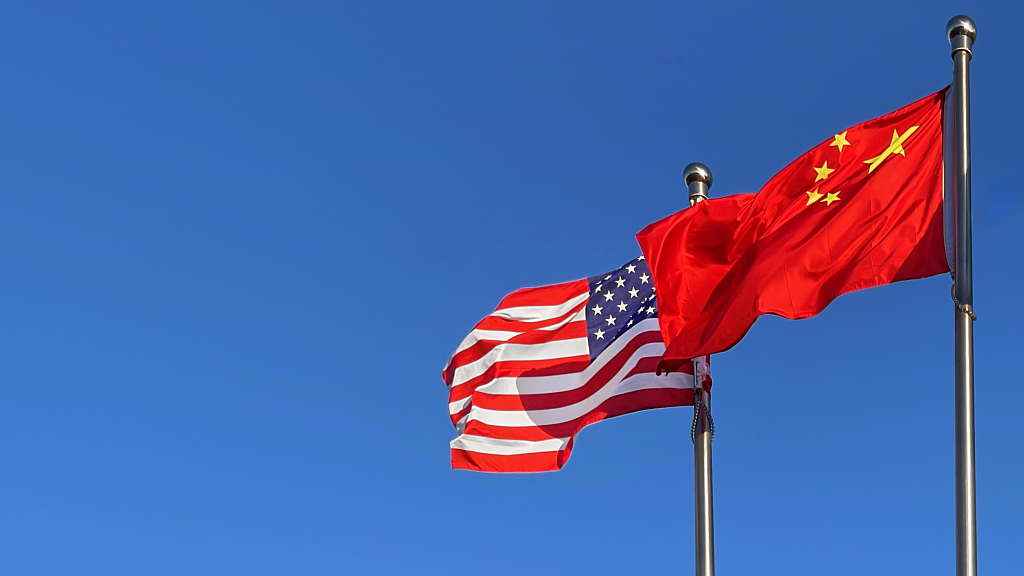
The national flags of China and the U.S. in Beijing, China, October 16, 2022. /CFP
The national flags of China and the U.S. in Beijing, China, October 16, 2022. /CFP
Editor's note: Stephen Ndegwa, a special commentator on current affairs for CGTN, is the executive director of South-South Dialogues, a Nairobi-based communications development think tank. The article reflects the author's opinions and not necessarily the views of CGTN.
The news that Chinese President Xi Jinping will have a one-on-one meeting with his U.S. counterpart Joe Biden in San Francisco alongside the Asia Pacific Economic Cooperation (APEC) Leaders' Meeting 2023 has raised interest globally. Nicknamed as the "Super Bowl of World Economies," the APEC meeting will bring together both political and business leaders from the 21-member economies in the Pacific Rim.
It was perfect timing for Biden, at a time he is facing a backlash against U.S. support of Israel in its devastating conflict with Palestine. The U.S. is feeling increasingly discredited in the international community, and might be indirectly seeking China's support and counsel on tackling mounting global challenges.
This will be the second face-to-face meeting between the two leaders since Biden took office in January 2021. The world is still waiting to exhale for the outcome of the first meeting that took place on the sidelines of the Group of 20 Summit in Bali, Indonesia, in mid-November 2022.
This time, Washington seems to have given a lot of weight to both the bilateral and global import of the two leaders meeting. According to the White House missive, trade is definitely top on the agenda. Many of the problems facing the bilateral relation can be attributed to the U.S.'s attempts at trade and technology decoupling. The U.S. has been on a trade war path with the aim of crippling its counterpart's supply chains, resulting in countries to look elsewhere for both supplies and markets.

A screen displays the "APEC 2023" logo at the International Media Center at Moscone Center in San Francisco, California, United States, November 11, 2023. /CFP
A screen displays the "APEC 2023" logo at the International Media Center at Moscone Center in San Francisco, California, United States, November 11, 2023. /CFP
In its approach to any rapprochement with the U.S., China has taken the precautionary "once bitten, twice shy" maxim. Experts say that the latter must have made its bottom line clear before the official announcement of the forthcoming meeting. This includes respecting China's "core interests," like its right to development, and the unequivocal admittance by the U.S. that the Taiwan region is part of China's territory. Besides the Taiwan question, Xi and Biden will deliberate on other matters that have a bane in the bilateral relations.
At a time when the world is undergoing grave challenges unforeseen in a century, a meeting between two of the world's most powerful countries can only create positive anxiety and hope. The flagging global economy, climate change, deteriorating peace in the Middle East and Ukraine, and other major power conflicts are issues that need to be addressed urgently.
But there are positive sides to China-U.S. relations. They have painstakingly kept lines of communication open through high-level visits, even when it appeared that they were not ready to meet eye to eye. Still, the meetings have served to show that the two partners need one other, at least for the sake of the world's stability.
The world is metamorphosing into a new dispensation that embraces multipolarity. The "my way or the highway" stance usually taken by the U.S. is no longer tenable in the emerging new era that is based on mutuality, and respect for the sovereignty of other countries. It is time the U.S. woke up and smelt the coffee, lest it loses clout among its friends as well.
Critically, the U.S. must respect other countries' ideological standpoints and world view. For instance, it is extremely condescending for the U.S. to belittle the "socialism with Chinese characteristics" political system as "retrogressive" and "authoritarian," while clear evidence shows that this system has catapulted the country to the second-largest economic status in an unprecedented four decades since the 1978 reform and opening-up policy, which has enabled the country to eradicate absolute poverty in only a few decades, contributing to the achievement of the UN Sustainable Development Goals.
The world is waiting for the outcome of the bilateral meeting with bated breath, hoping that the U.S. will apply the wisdom of America's "third time's a charm" folklore belief. With the previous failed attempts at restoring amicable relations between the two countries, the consequences of a successful attempt this time would make greater contributions to the harmonious coexistence of the major countries, which not only is a need of the two sides but also a call of the world and the time.
(If you want to contribute and have specific expertise, please contact us at opinions@cgtn.com. Follow @thouse_opinions on Twitter to discover the latest commentaries in the CGTN Opinion Section.)



